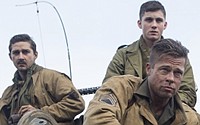
prd David Ayer, Bill Block, John Lesher, Ethan Smith
with Brad Pitt, Shia LaBeouf, Logan Lerman, Michael Pena, Jon Bernthal, Jason Isaacs, Jim Parrack, Anamaria Marinca, Alicia von Rittberg, Brad William Henke, Xavier Samuel, Scott Eastwood
release US 17.Oct.14, UK 22.Oct.14
14/UK Columbia 2h14

Men with a mission: LaBeouf, Lerman and Pitt




 Writer-director Ayer makes no attempt to update the rah-rah bombast of the WWII genre, indulging in the usual plot points, big action, faux heroism and "war is hell" rhetoric. The film is sharply assembled and very nicely acted by a terrific cast, but it ultimately feels oddly pointless.
Writer-director Ayer makes no attempt to update the rah-rah bombast of the WWII genre, indulging in the usual plot points, big action, faux heroism and "war is hell" rhetoric. The film is sharply assembled and very nicely acted by a terrific cast, but it ultimately feels oddly pointless.
By April 1945, Allied troops had made it into German territory. Wardaddy (Pitt) leads the crew of a tank named Fury: true believer Bible (LaBeouf), cheeky Gordo (Pena) and animalistic Coon-Ass (Bernthal), joined by rookie driver Norman (Lerman), who's awaiting his war nickname. As they head further into enemy territory, the tank ranks are drastically thinned by Nazi attacks, forcing the Fury crew to take a series of desperate last stands on their own.
For such a fine-looking film, the script is astonishingly blunt. It's directed on a grand scale, with tanks, planes and foot soldiers filling the expansive landscapes. The story is structured as a series of advances: to a base camp, to take a town, to head off a Nazi assault. And each episode offers the requisite macho camaraderie, battle chaos and some quieter, relatively humane moments.
The actors are solid, depicting varying levels of soldiers numbed to violence. So Lerman is the film's heart, the one who hasn't abandoned his conscience. Bernthal offers the polar extreme, a man with little humanity remaining. And Pitt holds the middle ground as the jaded but thoughtful leader who allows Norman some private time with a young German girl (von Rittberg) because "they're young and alive".
But aside from a hint of post-traumatic stress, there's very little subtlety. Germans are evil and Americans are heroes, even if their bravery could more accurately be described as violently idiotic. "If we're going to die, let's take out as many Nazis as we can" isn't heroism: it's barbarism.
So in the end it's rather difficult to understand why this film was made. There's a strong sense of how battle affects a soldier's mind (Ayer loves making movies about the catharsis that comes from releasing your inner warrior), but there's no exploration of how this affects a person or humanity as a whole. Maybe the film is an attempt to hark back to the last "just" war. But wouldn't it be far more relevant to explore more complex situations that offer some real insight?
 |
themes, language, violence | 19.Oct.14 |

 Still waiting for your comments ... don't be shy.
Still waiting for your comments ... don't be shy.
HOME | REVIEWS | NEWS | FESTIVAL | AWARDS | Q&A | ABOUT | TALKBACK